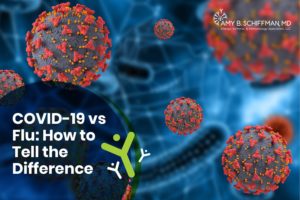Overview
There is no doubt that symptoms of the coronavirus-19 (COVID-19) and influenza (flu) can be very similar. This article will examine the differences between COVID-19 and the flu.
COVID-19 vs. Flu: Difference in Symptoms
Here’s a table outlining the difference in the symptoms of COVID-19 and flu. As the number of COVID-19 cases increases, new symptoms are appearing:
| Symptoms | COVID-19 | Flu |
|---|---|---|
| Loss of Taste and Smell | Common | Seldom |
| Chills | Common | Common |
| Cough | Common | Common |
| Loss of Appetite | Seldom | Common |
| Difficulty in Breathing | Common | Seldom |
| Fever | Common | Common |
| Headache | Seldom | Common |
| Fatigue | Common | Common |
| Sore Throat | Seldom | Seldom |
| Runny Nose | Seldom | Seldom |
| Bodyache | Common | Seldom |
| Diarrhea | Seldom | Seldom |
| Nasal Congestion | Seldom | Seldom |
| Asymptomatic | Common | Seldom |
The symptoms of flu often develop suddenly while COVID-19 symptoms are milder at the start, then gradually worsen.
COVID-19 vs. Flu: Incubation Period
The incubation period of flu is typically 1-4 days. On the other hand, COVID-19’s incubation period is between 1-14 days. However, the median incubation period for COVID-19 is 5.1 days.
COVID vs. Flu: Severity and Mortality Rate
The severity of both conditions ranges from mild to severe and even death. The World Health Organization (WHO) classified mild symptoms of COVID-19 that will not require hospitalization. Symptoms of mild cases include:
- fever
- cough
- fatigue
- loss of appetite
- sore throat
- headache
The WHO states that 80% of COVID-19 cases are made up of mild or asymptomatic cases, 15% are severe, and 5% are critical, requiring ventilator support. The current mortality rate of COVID-19 is higher than influenza. However, COVID-19 is still new, and data concerning severity and mortality rates are still evolving.
COVID vs. Flu: Transmission
SARS-CoV-2 and the flu virus both spread via respiratory droplets, from person to person. However, the difference in their transmission is the speed. Data shows that influenza spreads faster than COVID-19. Flu has a shorter median incubation period and a shorter time between successive cases, approximately 3 days. The time between consecutive cases for the COVID-19 virus is estimated to be 5-6 days.
Influenza is typically transmitted through pre-symptomatic transmission. COVID-19 is transmitted by symptomatic and asymptomatic modes of transmission. Social distancing protocols and wearing masks in public places help limit the transmission of both types of viruses.
COVID-19 vs. Flu: Treatment
There are more outpatient treatment options for the flu than COVID-19. There are antivirals which help limit the severity and duration of influenza if utilized early in the course of influenza symptoms.
For COVID-19, there are limited treatments available outside the hospital. People with mild cases of COVID-19 should discuss treatment options with their physicians. For severe cases, hospital physicians may choose to treat with steroids, Remdesivir, and convalescent plasma.
COVID-19 vs. Flu: Prevention
How to Prevent Flu:
- Get Vaccinated. Getting your flu shots is still the best way to prevent the flu.
- Avoid Close Contact. Flu viruses spread by tiny respiratory droplets dispersed by coughing, sneezing, or talking.
- Keep Your Hands Clean. Wash your hands to lower the risk of getting sick from touching a surface with the virus.
- Strengthen Your Immune System. Adhere to a healthy diet, and get plenty of exercises and sufficient sleep.
- Stop Smoking. According to a study conducted by researchers of the Yale School of Medicine, smokers develop more severe flu symptoms.
How to Protect Yourself from COVID-19:
- Staying at home
- Observe social distancing
- Wash your hands frequently
- Wearing a face mask when going out
- Adhere to proper coughing or sneezing etiquette
- Consult your physician via telemedicine/telehealth if you don’t feel well
- If you suspect you or a family member may have COVID-19, get tested via nasal swab as soon as possible.
- Avoid touching your face
- Avoid physical greetings such as kissing, hugging or shaking hands
- Avoid crowded public places
Bottomline
Dr. Amy Schiffman is an allergy and immunology specialist in Boca Raton, Florida. She is more than happy to help you during this troubling time. Call for an appointment to discuss prior or current COVID-19 diagnosis and address all your allergy and immunology concerns.

